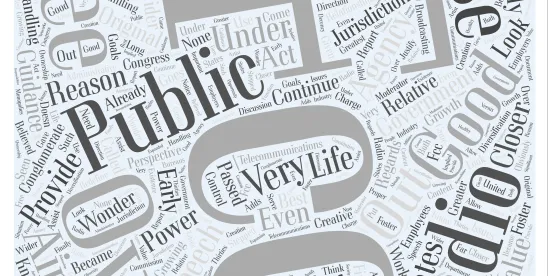In a much-awaited decision, the U.S. Supreme Court (Supreme Court) has ruled that in civil enforcement proceedings under the Telephone Consumer Protection Act (TCPA), whether brought by the Government or in private civil suits, the Federal district courts (District Courts) are not bound by the Federal Communications Commission’s (FCC) interpretation of the TCPA. Rather, the District Courts may independently assess whether the FCC’s interpretation of the TCPA is correct while giving the FCC interpretation “appropriate respect.”
The 6-3 decision in McLaughlin Chiropractic Associates, Inc. v. McKesson Corp. could have a profound impact on TCPA litigation, even more so than the Supreme Court’s Loper Bright Enterprises decision last June. For example, now both plaintiffs and defendants in TCPA class action proceedings can ask the District Courts to consider whether the FCC got it right on issues “decided” by the FCC and required under the Federal statute known as the Hobbs Act to be applied by those Courts in TCPA cases.
The McLaughlin litigation trek to the Supreme Court is a lengthy one. In 2014, McLaughlin filed a class action against McKesson for sending unsolicited faxes in violation of the TCPA. The complaint included a class that received faxes sent on traditional fax machines and faxes sent through online fax services. The District Court certified a class without distinguishing between the two classes of recipients. Later, at the behest of another company not a party to McLaughlin’s suit, the FCC issued a Declaratory Ruling (Ruling) that online faxes were not covered by the TCPA prohibition on unsolicited faxes.
After deliberation, the District Court now concluded that the Ruling was binding on its interpretation of the TCPA because the Hobbs Act provided that the Federal courts of appeals have “exclusive jurisdiction to enjoin, set aside, suspend (in whole or in part), or to determine the validity of . . . all final orders of the Federal Communication[s] Commission” reviewable under Section 402(a) of the Communications Act (emphasis supplied). As a result, the District Court then ruled its hands were tied – it had to apply the substance of the Ruling. As a result, it granted summary judgment for McKesson on the online fax claims, decertified the class and McLaughlin received an award of $6000 for 12 unsolicited traditional faxes.
McLaughlin appealed and, ultimately, the Supreme Court agreed to take the case to “decide whether the Hobbs Act required the district court to follow the FCC’s legal interpretation of the TCPA.” Writing for the majority, the opening of Justice Brett Kavanaugh’s opinion unequivocally said that it did not.
The Supreme Court found the Hobbs Act to be silent on whether a party who had not participated in the Hobbs Act review process may contest an agency’s legal interpretation in a subsequent enforcement proceeding (e.g., a TCPA class action brought after the FCC set the rule and the time for Hobbs Act review). Congress could have expressly precluded such a subsequent review as well but did not do so. Under those circumstances, Supreme Court, relying on the fundamental principles in the Administrative Procedure Act, held:
“In an enforcement proceeding, a district court must independently determine for itself whether the agency’s interpretation of a statute is correct. District courts are not bound by the agency’s interpretation but instead must determine the meaning of the law under ordinary principles of statutory interpretation, affording appropriate respect to the agency’s interpretation. See Loper Bright Enterprises v. Raimondo, 603 U. S. 369, 402 (2024).”
But what about the Hobbs Act hurdle? Justice Kavanaugh had no problem rejecting the three dissenting Justices’ reading of the Hobbs Act by making the distinction and framing the limitation of the Hobbs Act when it came to enforcement proceedings.
“The Hobbs Act does not preclude district courts in enforcement proceedings from independently assessing whether an agency’s interpretation of the relevant statute is correct. Here, therefore, the District Court should interpret the TCPA under ordinary principles of statutory interpretation, affording appropriate respect to the agency’s interpretation.
In short, the Hobbs Act does not bar McLaughlin from arguing in the district court enforcement proceeding that the FCC’s interpretation of the TCPA is incorrect. The Hobbs Act dictates how, when, and in what court a party can challenge a new agency order before enforcement. The Act does not purport to address, much less preclude, district court review in enforcement proceedings. So, the District Court in this enforcement proceeding can decide what the statute means under ordinary principles of statutory interpretation, affording appropriate respect to the FCC’s interpretation.”
So, where does this leave the FCC’s interpretations and applications of the requirements of the TCPA. At the very least, many are left subject to potential review by the District Courts. Coupled with Loper, those Courts now have much greater freedom to interpret the TCPA in civil enforcement proceedings.
But open questions remain about how they will do so. For example:
- The Supreme Court did not outline what would constitute “appropriate respect” for FCC decisions. How will the District Courts apply that standard? How does it fit with Loper ruling.
- The Supreme Court left open the “ordinary principles of statutory interpretation” that the District Courts must apply?
- The Supreme Court held that the District Courts are not bound “by the Federal Communications Commission’s interpretation of the act.” What types of past FCC will fall within this parameter? The Court did not appear to limit this principle to declaratory judgments. What about implementation of TCPA-related statutes like the TRACED Act.
- What current TCPA class action litigation cases could be affected, such as those involving alleged violations of the FCC’s so-called Quiet Hours rule (i.e., no solicitation calls to residential numbers before 8 a.m. and after 9 p.m. based on the location of the called party)?
- How will this ruling apply in TCPA actions brought in state courts, if at all?
In any case, it is reasonable to expect that the District Courts handling TCPA class actions will promptly be asked to address issues questioning whether the FCC correctly interpreted the TCPA in a variety of settings. In fact, District Courts are already applying the Supreme Court order to ongoing litigation. For example, a court in the District of Oregon recently denied a motion to dismiss, which challenged the FCC’s determination that a cell phone is a residential line. Wilson v. Hard Eight Nutrition LLC. 2025 WL 1784815 (D. Oregon June 27, 2025) (finding that the “FCC got it right” after conducting an independent review of “the text, structure, and purpose of Section 227(c) and of the TCPA as a whole, a cell phone is presumptively a residential telephone under the TCPA do-not-call provision, Section 227(c).”)





 />i
/>i

